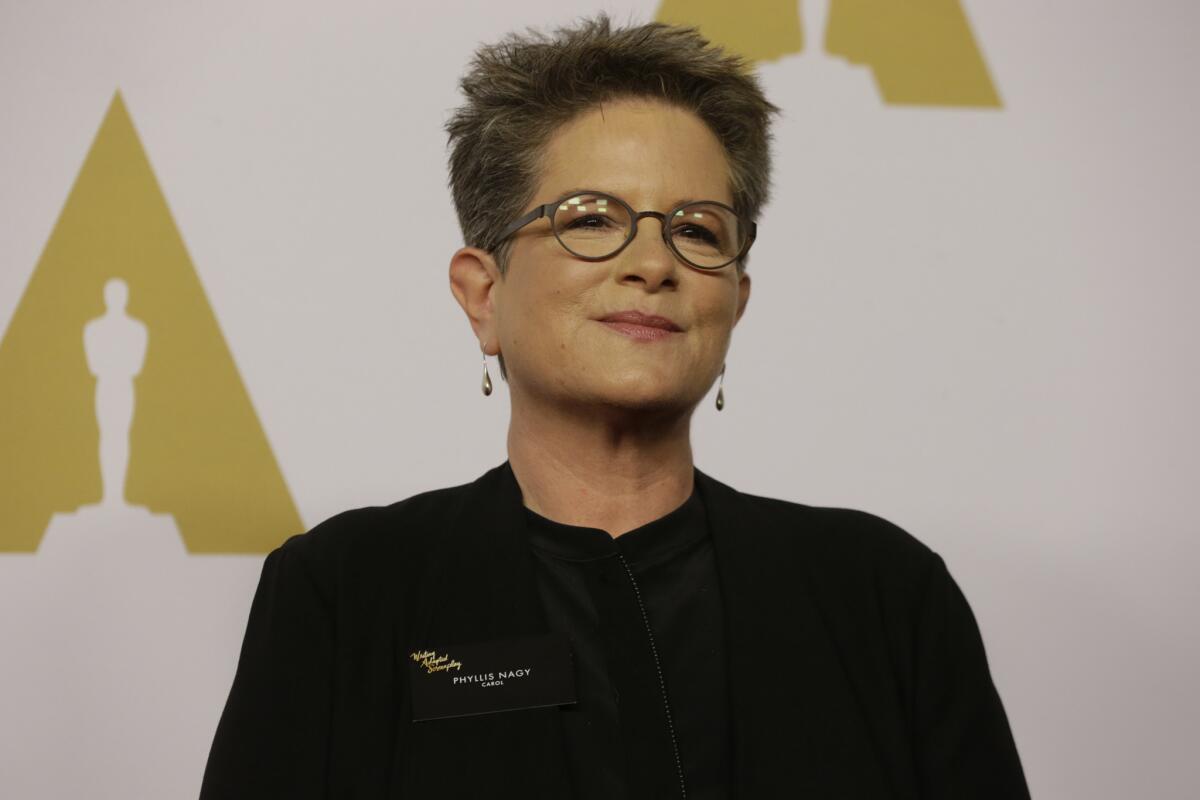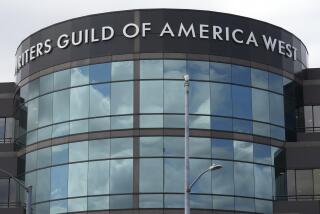Screenwriter Phyllis Nagy runs for president of WGA West, citing stalled negotiations

Phyllis Nagy arrives for the 88th annual Academy Awards luncheon at the Beverly Hilton Hotel.
- Share via
Oscar-nominated screenwriter Phyllis Nagy said she would run against Writers Guild of America West’s incumbent president, David Goodman, underscoring rising tensions inside the guild over its three-month standoff with agents.
Nagy announced her candidacy online Monday in a private online group where writers have aired their concerns over how negotiations have stalled between the WGA and the Assn. of Talent Agents.
After a strong vote of support from writers, the WGA instructed guild members in April to fire their agents after the sides failed to reach an agreement on a new code of conduct that would end long-standing industry practices.
The latest round of talks between the WGA and the ATA collapsed last month and the parties have turned to the courts to settle their differences, with the WGA suing the big four agencies, and three agencies so far — WME, CAA and UTA — countersuing the WGA.
“There appears to be no strategy now from the leadership,” Nagy said in an interview with the Los Angeles Times last week.
Nagy received an Academy Award nomination for the 2015 film “Carol” and was nominated for an Emmy for writing and directing the 2005 television drama “Mrs. Harris.”
Veteran writer William Schmidt also is challenging Goodman for president. He has called the union’s campaign a “jihad against agents.” The election will be decided September 16.
Other people who are challenging the guild’s leadership are Craig Mazin, the writer-producer of “Chernobyl,” who is running for vice president against incumbent Marjorie David; and Nick Jones Jr. who is running for secretary-treasurer. Officer candidates backed by the union’s nominating committee are Carl Gottlieb, a co-screenwriter on “Jaws,” who is running for vice president; and Evette Vargas and Michele Mulroney, who are running for secretary-treasurer.
This year, 21 people are running for eight open seats on the WGA West’s board, up from 11 board candidates in 2017.
Some of the candidates, including Nagy, were part of a group of dissidents known as Writers for Negotiation, which has been critical of the guild’s handling of its negotiations with agents.
In a statement posted online, Nagy said she would not seek to demonize the current leadership and credited them for bringing “important issues concerning agency abuses out into the light.”
But, she added, “as the action stretches on, it has become clear to many of us that there is no plan to resolve” the dispute.
Goodman was not immediately available for comment.
In an interview last week, Goodman said he believes the union leaders have widespread support from members and disputed assertions that they were not interested in resolving the conflict. He said agencies had failed to recognize the damaging effects of their foray into production.
“The fact is the agencies have not been willing to negotiate because they are hoping to keep the status quo, and they are doing that in the hopes of dividing our membership and convincing them that we’re being obstinate and that we’re not being realistic, when in fact that’s a description of them,” said Goodman, a showrunner for the Fox TV series “The Orville.”
The dispute between the WGA and the agencies centers on two major issues: packaging fees — the money agencies collect when they assemble talent for projects in lieu of the usual 10% commission — and affiliate production, when agencies or their parent companies own production companies. Writers say both practices present conflicts of interest, creating financial incentives for agents that don’t benefit their clients. Agencies maintain that packaging fees help their clients because they don’t have to pay a commission and they can manage potential conflicts.
As the dispute has dragged on, the WGA has continued to negotiate deals with individual agencies.
On Monday, Beverly Hills talent agency Kaplan Stahler broke ranks with the ATA, becoming the second firm associated with the group to accept terms laid out by the guild.
So far, more than 70 talent agencies have accepted the guild’s terms to end agency-affiliated production companies and packaging.
Critics have pointed out that most of the agencies that have agreed to the WGA’s terms are smaller. Kaplan Stahler, however, is notable because it is a midsize firm. Pantheon, another ATA member, had also agreed to the WGA’s code of conduct.
“Our goal remains to move the negotiation process forward with all unsigned agencies,” the guild’s negotiating committee wrote in a letter to members.
In a statement, Kaplan Stahler said the agreement will allow it “to return to representing its clients in a manner that both accommodates and supports the interests of the Guild and its members and preserves the agency’s unfettered ability to fulfill its fiduciary duties to its clients.”
The ATA did not immediately respond to a request for comment.
Kaplan Stahler’s agreement with the union includes some modifications to the code. The company will be required to share the contents of a writer’s contract, deal memos and invoices with the guild only if a writer does not file a written objection.
The agreement comes after the WGA and Abrams Artists Agency, another midsize agency, were unable to reach a deal.
More to Read
Inside the business of entertainment
The Wide Shot brings you news, analysis and insights on everything from streaming wars to production — and what it all means for the future.
You may occasionally receive promotional content from the Los Angeles Times.











